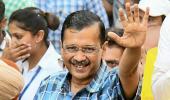The Supreme Court on Monday termed as 'unusual' the Delhi high court's decision of reserving the order while granting interim stay on the operation of the trial court's order granting bail to Delhi Chief Minister Arvind Kejriwal in a money laundering case linked to the alleged excise scam.

A vacation bench of Justices Manoj Misra and S V N Bhatti, which fixed June 26 for hearing Kejriwal's plea against the interim stay granted by the high court at the time of reserving its verdict on Enforcement Directorate's plea said, "Normally, on stay applications, orders are not reserved. They are passed at the hearing itself, on the spot. So, it is a bit unusual."
The bench said it would like to wait for the pronouncement of the high court order before taking a call on the Aam Aadmi Party national convenor's appeal.
During the brief hearing, senior advocate Abhishek Singhvi, appearing for Kejriwal, sought vacation of the interim stay on the bail order, contending it was contrary to the well-established norm that a bail granted is very different from a bail reversed or cancelled.
Giving the sequence of events that unfolded in the high court on June 21, Singhvi said, after the bail was granted on June 20, Additional Solicitor General SV Raju, appearing for the ED, made a mention before a vacation bench.
"This is important. On June 21, at the mentioning stage itself, in my presence, the judge stays the order and then the judge proceeds to hear us for some time on that day at length. Then reserves order," he said.
Contending that there are two or three legal points involved, Singhvi said, first, the procedure of staying a bail on the first attempt, on the first day and first challenge is 'unprecedented' and, secondly, the balance of convenience is totally in Kejriwal's favour.
"If the judgement is reversed, the man will go back to jail as he did when he was out for three weeks under the Supreme Court's direction. The Supreme Court had directed him to be out for three weeks and he went back immediately. Secondly, he is not a flight risk," Singhvi said.
The bench told Singhvi that pronouncing any order at this stage would be prejudging the issue which is before the high court.
"We will be pre-judging the issue, if we pass any order at this stage. It is not some other court but the high court," the bench told Singhvi.
It noted that the high court had on June 21 asked the parties to file written submissions on the interim relief of stay of the bail.
"The parties were directed to file short submissions not running more than two-three pages by June 24. Therefore it is expected that the order will be pronounced shortly, maybe in a day or two," the bench said.
Singhvi said the order was reserved on the interim relief sought by the ED, while the main matter is still pending, and if the bail order is reversed, Kejriwal will go back to jail like he did on June 2.
"Why can't I be free? I am not a flight risk. I will go back to jail the moment the order is reversed. I have a judgement in my favour," he submitted.
The bench asked Raju about the twin conditions under section 45 of the PMLA and whether they were satisfied.
The ASG said he was not given an opportunity to argue in detail and file the reply.
Solicitor General Tushar Mehta, also appearing for the ED, said the twin conditions were not met as the trial court itself said it has not gone through the records and Raju was not given optimum time to argue his case.
Under section 45 of the Prevention of Money Laundering Act, an accused can be granted bail subject to twin conditions that the court is prima facie satisfied that he is not guilty of such offence and the prosecutor has been given an opportunity to oppose the application for bail.
Singhvi urged the bench to stay the high court order before it is pronounced.
"I know what I am asking. This court must stay the high court judgment before it is pronounced just like the high court had stayed the bail order on mere mentioning by the ED," he submitted.
Justice Misra said if the high court made a mistake, why should this court repeat it. Singhvi urged the matter to be listed later this week, contending it related to personal liberty.
The bench then posted the matter for hearing on Wednesday.
The high court had on Friday paused Kejriwal's release after the trial court granted him bail on June 20.
Kejriwal, who was arrested by the ED on March 21, could have walked out of Tihar jail on Friday last had the high court not granted the interim relief in favour of the federal anti-money laundering agency.
It also issued a notice to Kejriwal seeking his response to the ED's plea challenging the trial court's June 20 order by which he was granted bail and listed it for hearing on July 10.
In its bail order, the trial court had held that prima facie, Kejriwal's guilt was yet to be established and that the ED had failed to furnish direct evidence linking him to the proceeds of crime in the money laundering case.
The excise policy was scrapped in 2022 after the Delhi lieutenant governor ordered a Central Bureau of Investigation (CBI) probe into alleged irregularities and corruption involving its formulation and execution.
According to the ED and the CBI, irregularities were committed while modifying the policy and undue favours extended to the licence holders.











 © 2025
© 2025